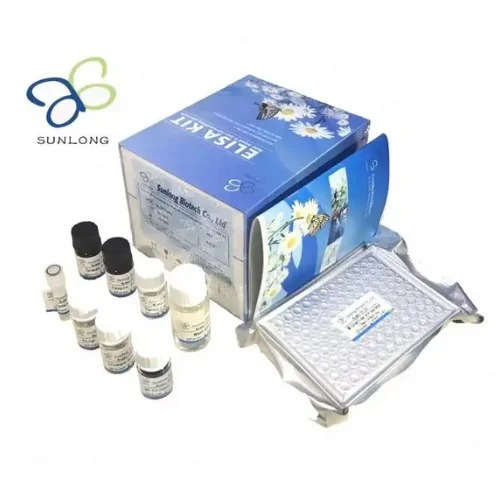Leptin, LEP ELISA Kit
Catalog No :
CAS Number :
Brand :
In Stock
Sample Volume: 50ul
Wavelength: 450nm
Assay range:15.6 pg/ml - 1000 pg/ml
Sensitivity:3.5 pg/ml
Standard:1350 pg/ml
Specifications:
| Application | ELISA-Based Assays |
| Storage Temperature | 2-8°C |
| Product Type | Elisa Kit |
| Product Brand | SUNLONG BIOTECH |
| Product Grade | Molecular Biology |
The Leptin (LEP) ELISA Kit is a sensitive and specific assay designed for the quantitative measurement of Leptin levels in human and animal samples including serum, plasma, urine, cell culture supernatants, and tissue homogenates. Variants are available with antibodies sourced from multiple species, including Sheep, Guinea Pig, Goat, Porcine, Chicken, Rabbit, Rat, Mouse, and Human, making this kit highly versatile for research applications.
Sample Preparation
1. Serum Preparation
- Collect whole blood and allow it to clot at room temperature for 10–20 minutes.
- Centrifuge at 2,000–3,000 rpm for 20 minutes to separate the serum.
- Re-centrifuge if precipitates appear during storage.
2. Plasma Preparation
- Collect whole blood into tubes containing anticoagulants (e.g., EDTA or citrate).
- Incubate at room temperature for 10–20 minutes.
- Centrifuge at 2,000–3,000 rpm for 20 minutes to obtain plasma.
- Re-centrifuge if necessary.
3. Urine Samples
- Collect urine in aseptic tubes.
- Centrifuge at 2,000–3,000 rpm for 20 minutes and carefully collect the supernatant.
- Re-centrifuge if precipitates form during storage.
4. Cell Samples
- For cell secretions, collect culture supernatants in aseptic tubes and centrifuge at 2,000–3,000 rpm for 20 minutes.
- For intracellular components:
- Dilute cells in PBS (pH 7.2–7.4) at 1×10⁷/mL.
- Disrupt cells via repeated freeze-thaw cycles.
- Centrifuge at 2,000–3,000 rpm for 20 minutes and collect the supernatant.
5. Tissue Samples
- Cut and weigh tissue samples, then freeze in liquid nitrogen and store at -80°C.
- Homogenize samples in PBS (pH 7.4) at 4°C.
- Centrifuge at 2,000–3,000 rpm for 20 minutes and collect the supernatant.
Important Notes
- Perform ELISA assays as soon as possible after sample collection.
- Store samples at -20°C if immediate testing is not feasible.
- Avoid repeated freeze-thaw cycles to preserve sample integrity.
- Do not use samples containing sodium azide (NaN₃) as it inhibits HRP activity.
Specifications
- Sample Types:
- Serum, plasma, urine, cell culture supernatants, tissue homogenates.
- Unit of Measure:
- 96 Tests/Kit.
- Antibody Source Variants:
- Sheep, Guinea Pig, Goat, Porcine, Chicken, Rabbit, Rat, Mouse, Human.
Applications
- Obesity Research:
- Study Leptin's role in appetite regulation and energy metabolism.
- Endocrine and Metabolic Studies:
- Investigate Leptin’s involvement in metabolic syndrome and diabetes.
- Neuroendocrine Research:
- Explore the interaction between Leptin and the hypothalamus in regulating body weight.
- Reproductive Studies:
- Assess Leptin’s role in fertility and pregnancy.
- Therapeutic Development:
- Evaluate Leptin as a potential target for obesity and metabolic disorder treatments.
Advantages
- High Sensitivity and Specificity:
- Detects low levels of Leptin with minimal cross-reactivity.
- Versatile Antibody Sources:
- Available in multiple species for diverse research needs.
- Wide Sample Compatibility:
- Validated for serum, plasma, urine, cell culture supernatants, and tissue homogenates.
- Ease of Use:
- Pre-coated plates and ready-to-use reagents simplify assay execution.
Kit Variants by Antibody Source
| Reference | Antibody Source | Unit of Measure |
|---|---|---|
| SL00009Sp | Sheep | 96 Tests/Kit |
| SL0059Gp | Guinea Pig | 96 Tests/Kit |
| SL0085Gt | Goat | 96 Tests/Kit |
| SL0098Po | Porcine | 96 Tests/Kit |
| SL0119Ch | Chicken | 96 Tests/Kit |
| SL0123Rb | Rabbit | 96 Tests/Kit |
| SL0441Ra | Rat | 96 Tests/Kit |
| SL0608Mo | Mouse | 96 Tests/Kit |
| SL1052Hu | Human | 96 Tests/Kit |
Storage and Stability
- Storage Conditions: Store all kit components at 2–8°C.
- Shelf Life: Ensure proper storage for long-term reagent stability.
The Leptin (LEP) ELISA Kit is a critical tool for researchers studying metabolism, obesity, and neuroendocrine functions. Its versatility, high sensitivity, and availability in various antibody sources make it ideal for a wide range of clinical and experimental research applications.
- Antibody Source: Rat Human Sheep Rabit Mouse Porcine Chicken Guinea Pig Goat




 0
0
